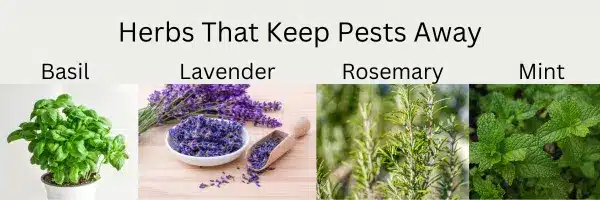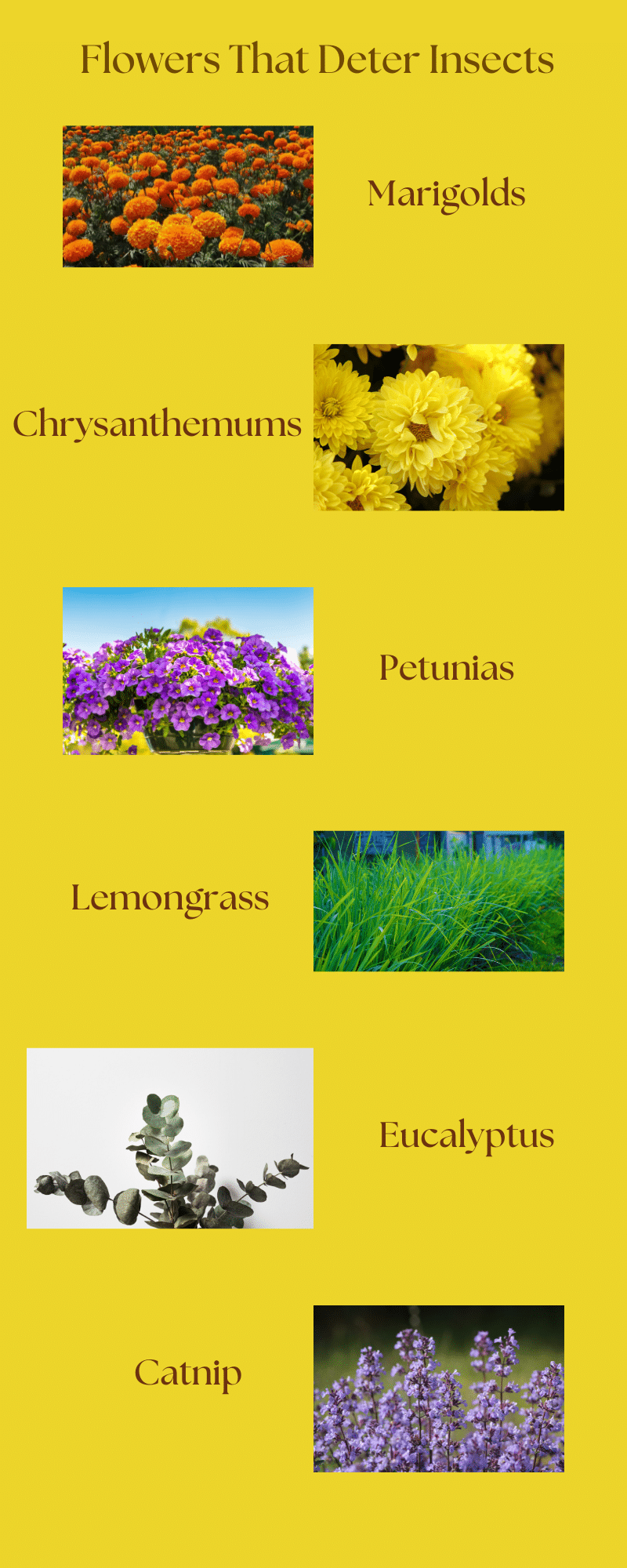Nothing makes a nice summer evening worse than a bunch of mosquitoes or a line of ants on your patio. Bug sprays can help, but they often smell bad and can have chemicals that aren’t safe for kids or pets. The good news is that you can naturally keep these pests away. You just need to plant the right plants in your yard, garden, or in pots on your porch.
Some plants are not only beautiful, but they also keep bugs away with their natural smells and oils. These plants release scents that insects dislike, or they create oils that interfere with the insects’ ability to find their way. Here are some of the best plants that garden experts recommend for keeping those pesky pests away.

Why Use Plants to Repel Bugs?
Using plants to keep bugs away is a smart and natural method. It helps protect your space while also adding beauty and nice smells. This way, you won’t depend on chemical pesticides. It’s an easy way to make your home more pleasant and tackle a common issue. Here are reasons why plants are a great choice:
- They are all-natural. There are no strange chemicals; it’s just nature at work.
- They smell great. Many of these plants are nice-smelling herbs or flowers that you’ll enjoy having nearby.
- They have several uses. Some can be used in cooking. Others can add color and texture to your space or even help improve air quality.
- They are safe for pets and kids. Unlike many store-bought repellents, these plants are safe for young ones (but some, like eucalyptus, should be out of reach of pets).
- They last a long time. Unlike bug sprays that fade away quickly, these plants keep repelling insects as long as they are healthy and alive.
Best Plants That Repel Bugs Naturally

Herbs That Keep Pests Away
These herbs do more than make your meals tasty. They also help keep bugs away from your space. A lot of these herbs have essential oils that can repel common pests. This makes them a good choice for both outdoor and indoor areas.
Basil (Ocimum basilicum)
Basil is not just for making pesto. This herb helps keep flies and mosquitoes away. Its strong scent is what works, so it’s a good idea to plant it near your door or seating areas. You can also crush some leaves and rub them on your skin for added protection. Basil is easy to grow in pots or in the ground. It loves warm weather and lots of sunshine. Plus, having fresh basil (Ocimum basilicum) at home lets you easily use it in your cooking!
Lavender
Lavender has a wonderful smell and is known to help you feel calm. Bugs dislike it because of its strong odor. Moths, fleas, mosquitoes, and certain flies avoid lavender plants. You can keep a pot near your windows. You can also dry the flowers and put them in your closets to keep moths away from your clothes. Lavender is great for making homemade bug sprays and sachets. It is a versatile plant for pest control and relaxation.
Rosemary
Rosemary is a wonderful herb with its aromatic foliage. It adds flavor to your cooking and keeps mosquitoes and other flying bugs away. If you like to have summer bonfires, toss some rosemary into the fire. Its smoke naturally repels mosquitoes. Rosemary grows best in warm climates, but you can also grow it indoors if you live in colder places. Its woody stems and fragrant leaves make it a nice decorative plant that is useful, too.
Mint
Mint has a nice smell for us, but ants, mosquitoes, and spiders don’t like it at all. It grows very fast, so it’s better to plant it in pots instead of in the ground unless you want it to take over your garden. A bonus is that you can use the leaves to make tea or mojitos! Mint is a tough plant that grows well in different conditions, making it a good pick for new gardeners. Its strong smell helps cover up scents that draw in bugs, helping to keep your area free from pests.
Flowers That Deter Insects

Flowers not only make your yard beautiful, but they can also keep bugs away from your outdoor parties. These flowers release natural chemicals that repel insects. Plus, they add bright colors to your area.
Marigolds
Marigolds are colorful and happy flowers. They are also good at keeping away pests like mosquitoes, aphids, and squash bugs. If you have a vegetable garden, planting marigolds nearby can help protect your crops from being eaten by these bugs. Marigolds have pyrethrum, a natural insecticide found in many bug sprays. They are simple to grow and need little care, making them a good choice for flower beds and potted plants.
Chrysanthemums
These flowers have a natural insect killer called pyrethrum. This can keep away ants, ticks, roaches, spider mites, and even bedbugs. Many bug sprays use chrysanthemum extract, but having the plant near can really help keep your space free of pests. Chrysanthemums come in many colors. They make a great addition to gardens by providing beauty and pest control. Make sure to plant them in soil that drains well and give them full sun to get the best results.
Petunias
Petunias are easy flowers to care for. They bring bright colors to your yard and help keep pests like aphids, beetles, and leafhoppers away. They work well in hanging baskets or flower beds close to windows. Because they can naturally repel pests, gardeners love them for a simple way to keep bugs away without using chemicals.
Other Bug-Repelling Plants
Some plants do not easily fit into the herb or flower group. However, they are great at keeping bugs away. You can use these plants in your garden or in pots. They work well to create a shield against pests you do not want.
Citronella (Lemongrass)
You might have noticed citronella candles for sale. But did you know the plant called Cymbopogon nardus is even more effective? Citronella grass has a strong lemon smell that mosquitoes dislike. You can plant it in big pots around your patio. Or, you can crush the leaves and rub them on your skin for more protection. This plant grows quickly in warm areas, which makes it a great choice for keeping mosquitoes away in the summer.
Eucalyptus
Eucalyptus smells fresh and can help keep mosquitoes and ticks away. It grows well in warm places, but smaller types can be potted and brought inside during the winter. You can also dry the leaves and use them in DIY sachets or sprays to protect against bugs for a long time.
Catnip
Catnip isn’t only for cats. It’s better than DEET at keeping mosquitoes away. You can plant it in pots or your garden. Just be careful. If you have cats, they might enjoy it as much as mosquitoes do not! Catnip has a compound called nepetalactone. This compound affects the sensory receptors of mosquitoes, making it a strong natural repellent.
Utilizing Petunias for Natural Pest Control
Petunias are not only lovely flowers, but they can also help control pests in your garden. These bright blooms can keep away several garden pests like aphids, tomato hornworms, and squash beetles. This happens because they make certain compounds that insects dislike. So, petunias are great for keeping your garden free from pests. When you plant petunias in your flower beds or near vegetable patches, you make your garden look nicer and create a natural shield against unwanted bugs.
Petunias do well in full sunlight and in some shade. They are also easy to care for. These flowers grow best in soil that drains well and need a moderate amount of water. This makes them low-maintenance for your outdoor space. Petunias are cheerful and help keep pests away. They also attract good insects like bees and butterflies, which help create a healthy garden. Adding petunias to your yard can enhance your outdoor experience. They bring beauty and help with pest control too.
Employing Ageratum to Discourage Bugs
Ageratum, known as floss flower, is great for any garden that wants natural insect repellents. It is famous for its beautiful blue flowers. Ageratum gives off a strong scent due to a chemical called coumarin. This scent helps keep away mosquitoes and other pests. Because of this, it is a smart choice for people who want to keep their outdoor space free from bugs. The lovely smell is nice for us and also works as a natural shield against unwanted insects. This helps make your outdoor area pleasant and comfortable.
Ageratum is not just good at keeping pests away. It is a tough plant that can grow in many conditions. Ageratum likes partial to full sunlight and needs about an inch of water each week to grow well. It is important to know that Ageratum can be toxic to cats and dogs. If you have pets, you should place it where they cannot reach it. Adding Ageratum to your garden can make your outdoor space more beautiful while helping to keep pests away.
Incorporating Venus Fly Traps into Your Garden
Venus fly traps are interesting and special plants for pest control. These unique, carnivorous plants are eye-catching and help with natural pest control by catching insects like flies and spiders. When a bug touches the sensitive hairs inside the trap, the leaves quickly snap shut, trapping the unsuspecting insect. This makes Venus fly traps a great choice for any garden, especially for people who want to control pests without using chemicals.
These plants grow best in certain conditions. They need a lot of sunlight and soil that is moist and acidic. Although many people grow them in pots, you can also use Venus fly traps in your garden as a trap crop. By putting them in spots where pests are common, you can attract helpful insects while keeping the bad pests away. Their interesting way of feeding makes them not only useful but also fun to have in your garden.
Benefits of Borage as a Natural Repellent
Borage is a great plant that is useful in the garden. One of its best qualities is that it can be a natural mosquito repellent. The fresh leaves of Borage smell lemony, like lemon balm. This scent drives away mosquitoes, making it a good choice to keep them away. Also, Borage attracts beneficial insects, like bees and hoverflies. These insects help to pollinate your garden and control pests. By adding Borage to your outdoor space, you can improve the garden’s health while keeping unwanted insects away.
Adding Borage to your garden is easy. It grows well in full sun and needs good drainage in the soil. It’s strong and can handle poorer soil too, so it’s a great choice for different garden types. The tasty leaves and pretty blue flowers are good for salads or as decorations, making your meals look nice and taste better. When you plant Borage, you get a natural mosquito repellent and a helpful plant that improves your garden.
Exploring the Use of Tansy in Bug Control
Tansy is a great friend in the fight for natural pest control. It has bright yellow flowers and leaves that look like ferns. Tansy gives off a strong odor that many insects, like ants and cabbage moths, do not like. Because of this, it helps homeowners keep pests away from their gardens without using chemical pesticides. Tansy also brings in honey bees. It works especially well against asparagus beetles and other garden pests, keeping your plants safe from damage.
When you add Tansy to your garden, think about how to grow it. This strong plant grows best in full sun and needs well-drained soil. This makes it great for many spots in your garden, even near fruit trees. However, be careful because Tansy can spread quickly if you don’t keep an eye on it. You need to maintain it regularly to keep it in check. If you plant Tansy smartly, you can create a natural barrier against pests while enjoying its lovely flowers and nice smell.
Understanding the Role of Wormwood in Pest Management
Wormwood is a special plant that helps manage pests because of its strong odor. This aromatic herb, along with salvia officinalis, keeps away several common pests like cabbage moths and flea beetles. This makes it a great choice for any garden. The smell of Wormwood affects the senses of these insects, stopping them from getting close to your plants. By using Wormwood in your outdoor space, you can enjoy a nicer feel while keeping pest levels under control.
Wormwood grows best in full sun and in soil that drains well. This makes it a great option for many garden situations. However, you should remember that this plant can be toxic if eaten. So, it’s a good idea to keep it away from pets and children. Adding Wormwood to your garden offers a natural pest control method. It also brings texture and interest to your yard. With its ability to repel pests and its beautiful look, Wormwood is a great choice for gardeners who want a lovely and bug-free environment.
Conclusion
Want to know how to use plants for natural pest control? Using plants to keep bugs away is a simple, natural way to make your home and yard feel better. Whether you pick herbs, flowers, or other green plants, they can help keep pests away while making your space look nice and smell good. Try a few of them. You may find yourself turning to plants instead of bug spray this summer!
Do you have a plant that helps keep bugs away? Please leave a comment below and share your advice!

